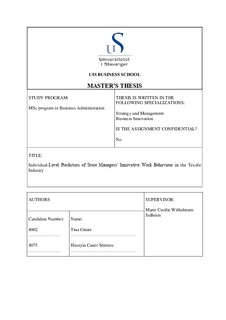| dc.contributor.advisor | Solheim, Marte Cecilie Wilhelmsen | |
| dc.contributor.author | Gimre, Tina | |
| dc.contributor.author | Sönmez, Hüseyin Caner | |
| dc.date.accessioned | 2019-09-12T18:28:12Z | |
| dc.date.available | 2019-09-12T18:28:12Z | |
| dc.date.issued | 2019-06 | |
| dc.identifier.uri | http://hdl.handle.net/11250/2616647 | |
| dc.description | Master's thesis in Strategy and Management and Business Innovation | nb_NO |
| dc.description.abstract | This master thesis contributes to the research field of Innovative Work Behaviour (IWB) by investigating variables that possibly are vital for achieving innovative results. Our research problem was: What is the Relationship between Store Managers’ Characteristics and Innovative Work Behaviour? This project examined nine potential predictors of IWB in light of Self-Determination Theory (SDT) and Implicit Person Theory (IPT). Specifically, we have studied three groups of predictors of IWB, including demographic and socioeconomic variables (gender, age, educational level and job tenure), BPNs (autonomy, competence and relatedness) and IPTs (intelligence and innovation). Empirically, we have collected data with questionnaires, and our population consists of approximate 100 store managers working in an anonymous clothing company. The respond rate for this survey was 53%. The obtained data is analysed with correlation coefficients and hierarchical multilevel regressions using IBM SPSS Statistics 25 and Stata 14.2 software.
An Exploratory Factor Analysis (EFA) identified two dimensions of IWB, ideation and implementation. Ideation includes activities that involve opportunity exploration and idea generation, while implementation includes activities that involve idea championing and application. Our results indicate that almost 80% of the store managers show a high or very high level of innovative behaviour. In short, we have found little support for our hypotheses about demographic and socioeconomic variables in this thesis, but it proposes that long job tenure may play a significant role in implementation activities. Regarding BPNs, the results for autonomy were unclear, but they were positive and more promising for competence and relatedness. Finally, our results indicate a positive relationship between IPT of intelligence and IWB, and IPT of innovation appears to be the strongest predictor of IWB in this study. To conclude, this research project suggests that more studies should investigate the connection between IWB and IPT. | nb_NO |
| dc.language.iso | eng | nb_NO |
| dc.publisher | University of Stavanger, Norway | nb_NO |
| dc.relation.ispartofseries | Masteroppgave/UIS-HH/2019; | |
| dc.rights | Navngivelse 4.0 Internasjonal | * |
| dc.rights | Navngivelse 4.0 Internasjonal | * |
| dc.rights.uri | http://creativecommons.org/licenses/by/4.0/deed.no | * |
| dc.subject | økonomi | nb_NO |
| dc.subject | administrasjon | nb_NO |
| dc.subject | innovation | nb_NO |
| dc.subject | økonomi og administrasjon | nb_NO |
| dc.subject | strategi og ledelse | nb_NO |
| dc.title | Individual-Level Predictors of Store Managers’ Innovative Work Behaviour in the Textile Industry | nb_NO |
| dc.type | Master thesis | nb_NO |
| dc.subject.nsi | VDP::Social science: 200::Economics: 210::Business: 213 | nb_NO |

